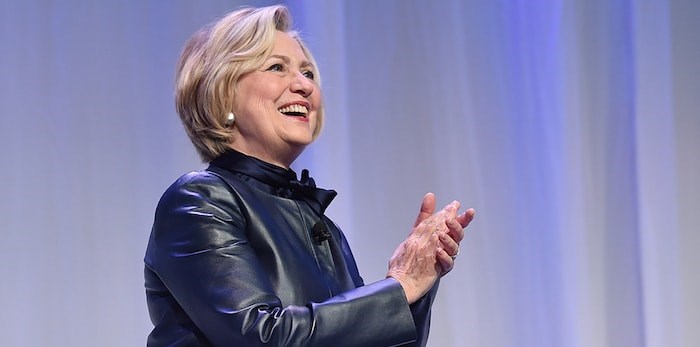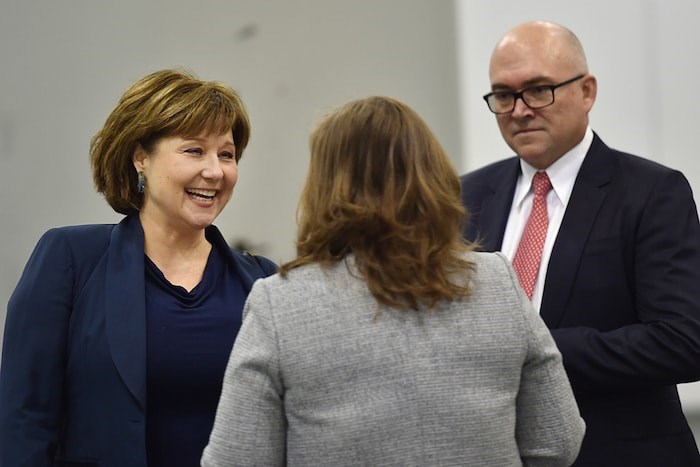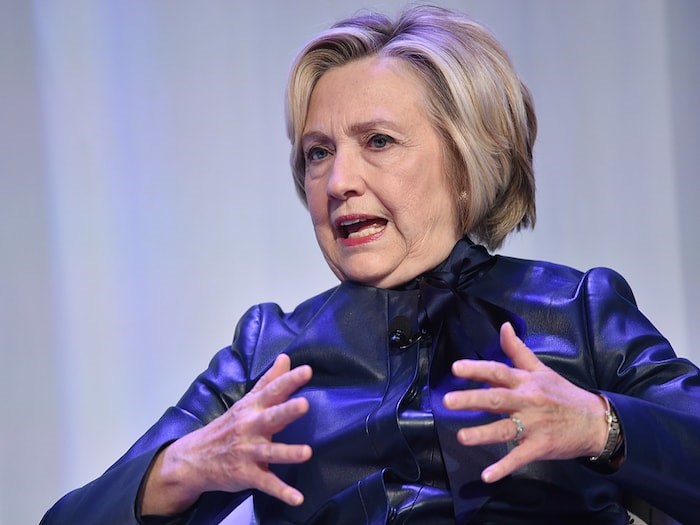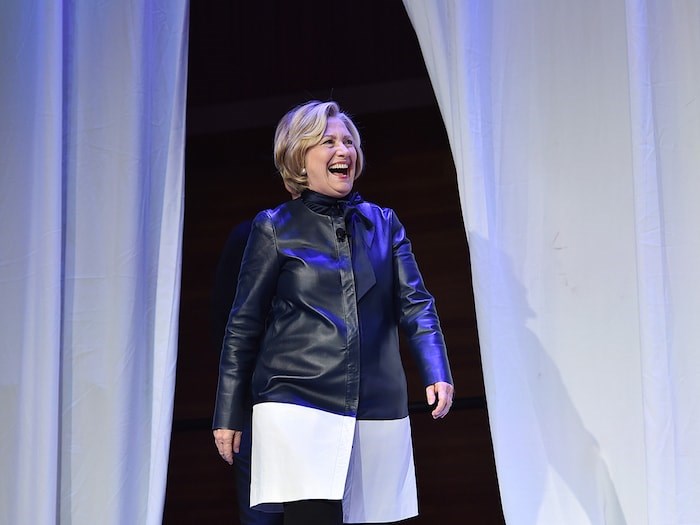I wasn't one of the approximately 5,200 ticket holders for today's Hillary Clinton event at the Convention Centre in Vancouver. The former U.S. Secretary of State and 2016 Democratic presidential candidate made the ΒιΆΉ΄«Γ½Σ³»stop on the last leg of her U.S. and Canada tour in support of her 2017 release "What Happened."
 Hillary Rodham Clinton spoke at the ΒιΆΉ΄«Γ½Σ³»Convention Centre Wednesday December 13, 2017. Tickets ranged in price from $75 to $1,500 which included a copy of her latest book. 5200 people attended, it was a sold out event. Photo: Dan Toulgoet
Hillary Rodham Clinton spoke at the ΒιΆΉ΄«Γ½Σ³»Convention Centre Wednesday December 13, 2017. Tickets ranged in price from $75 to $1,500 which included a copy of her latest book. 5200 people attended, it was a sold out event. Photo: Dan Toulgoet
Clinton has been doggedly doing the rounds for the hefty tome which attempts to parse the events leading up to her loss to Republican Donald J. Trump in the race for the White House, doing book signings and, as in Vancouver, larger-scale moderated speaking events.
I wasn't a ticket holder, but I was there, mind you, in the press row. I jumped at the chance to attend because as a Canadian-born American immigrant, I have followed Clinton's--and the Clintons--career for over two decades as an interested party. (Before you wonder, but did you vote for her in 2016? I will admit that I didn't do the paperwork in time, but that's neither here nor there, because my former home state of California didn't necessarily need my vote to tip the scale in her favour there.)
But today I wanted to listen to Clinton as a Canadian. As a Vancouverite. And, to a lesser extent, as a woman, and as a member of the media. What could I glean from this accomplished but flawed woman who I have admired, and take with me into my life, here and now in Canada.
I wondered, too, looking at the thousands of people, mostly middle-aged women, crowding the room at the Convention Centre, many clutching their hardback copies of "What Happened" what they were doing there. Why they dropped big bucks to crane their necks at the smallish speck that was Clinton on the stage, to hear much of what she has said before. Hell, even former B.C. Premier Christy Clark was there, book in hand.
 Former B.C. Premier Christy Clark at the Hillary Clinton βWhat Happened?β book tour event in Vancouver, December 13, 2017. Photo: Dan Toulgoet
Former B.C. Premier Christy Clark at the Hillary Clinton βWhat Happened?β book tour event in Vancouver, December 13, 2017. Photo: Dan Toulgoet
Admittedly, the event did get off on the wrong foot. The pre-talk "entertainment" was a bit of misfire; Toronto-based singer Mark Masri is immensely talented, but if his mixed bag of BublΓ©, Bocelli, and his own compositions and his looks were meant to make the ladies swoon, well, it actually felt more like an insult. As one woman in the row ahead sighed, "I could be doing something else instead of listening to this." And, in an almost shockingly un-Canadian response, when Masri said he was going to sing another, pockets of the crowd erupted in "boos" and "no!" Ouch. It's not his fault, though--they came for Clinton.
Clinton did eventually emerge, to a standing ovation, which moderator Bob Rennie (an unconventional choice) then requested we duplicate, despite her objections.
Rennie, clearly a fan, offered a lot of preamble to his multi-pronged questions, but Clinton took every question in stride, and she knows how to play to a crowd. Even a Canadian one. A few nods to our beautiful city and country ("I've always loved visiting Canada,") and wistfulness about our country having "a charismatic, competent leader who cares about policy," and his "gender-balanced cabinet," and there was our inclusion.
 Photo: Dan Toulgoet
Photo: Dan Toulgoet
Much of the rest of the talk was very focused on "What Happened" the book, and the experience. A few highlights:
- On Russian trolls: "Let's not mince words. This is a new kind of Cold War."
- What would be different if Clinton had won: The U.S. would not have backed out of the Paris Climate Accord, they'd be dealing with North Korea with "sustained, disciplined diplomacy," the U.S. would be helping people in Africa and Latin America, and the country would "not be giving any dog whistles to the KKK or any white nationalists."
- Is Trump's behaviour calculated or illness? "It's a combination of calculation and gut instinct." Trump began by taking up the anti-Obama "birther" movement years ahead of his campaign for presidency and carefully gathered up supporters who he knew had an appetite for expressing unpopular outdated opinions.
- Trump's Twitter habit? "An excessive amount of Diet Cokes," may be to blame, says Clinton (mostly) jokingly. Clinton says considering the many Presidents she has worked beside, for, or were married to, she "can't imagine any of them spending time tweeting, golfing, or watching TV" as Trump does.
- Tuesday's election in Alabama, which saw Trump-backed Roy Moore defeated: "A very important turning point...in holding President Trump and most of his vitriolic advisors accountable." But: "We still have work to do."
- Fox and the "fake news machine": Clinton says she doesn't believe in the term "fake news," preferring to call that kind of information "lies, fraud." However, with the public clearly struggles with the number of right-wing outlets and online voices--real or bots--that leave Americans "awash in fraudulent voices" that are hard to sort out.
- On media, post-Trump: During the election, "mainstream media was gobsmacked" by Trumps antics, and chose to pursue stories about him because it was good for ratings. Trump "was never held accountable," and Americans have to be "better consumers," and the press "better editors and curators" of accurate information.
- On Trump recognizing Jerusalem as the capital of Israel: Trump essentially gave away any "leverage" the U.S. may have had. "This is still playing itself out," but she wonders "is this the end of our legitimate effort to get a two-state solution?"
Possibly one of the most relevant subjects Clinton spoke on was the threat of nuclear war. Rennie noted our proximity to Seattle, and Clinton expressed concern that the U.S. needs to make sure all "checks and balances are in place" to ensure Trump doesn't make a fatal decision while having a "tantrum." We Canadians hope so, too.
One of Rennie's last questions began with an excerpt--not from "What Happened" but from a letter Chelsea Clinton that ran in Teen Vogue's Vol. IV, for which Hillary Clinton . Both seemed a little choked at the sentiments, but the direction we were taken next was on the subject of relevance and resilience (I want to hear more about Clinton's thoughts on the changing tide of media, on women's voices in the media! I thought).
 Hillary Clinton in Vancouver, December 13, 2017. Photo: Dan Toulgoet
Hillary Clinton in Vancouver, December 13, 2017. Photo: Dan Toulgoet
Clinton spoke eloquently about her mother Dorothy's difficult childhood, and the role kindness and compassion played in helping Dorothy make it though, and then, in turn, pass on those values to Hillary. Other women, and other people, around the world, who refuse to give up, keep Clinton going, she says. "They keep finding hope within themselves," she says, adding "I'm gonna keep fighting for what I think is right."
And then gender. It's a big one. I wager it's something many of the audience are keen to hear Clinton talk about feminism, particularly in this "#metoo" era of speaking out--we could have spent some productive time in this turf.
Women who disparage other women "creates permission" for that culture to be perpetuated, posits Clinton. And still, so many white women defer to the men in their lives when it comes to making political choices. While young women may enter the work force earning on par with men, the "pay gap opens up against them" and it is "implicit, unrecognized, unconscious bias that penalizes women."
Clinton says she hears often from women who are tired from having to be activists, making phone calls to elected representatives, and fighting the good fight. (I wonder here, if this resonates with Canadian women. Does our fight play out the same way?)
But the fight is worth doing in the long run, says Clinton. "All the work, all the effort," will pay off, and she remains committed to doing "everything I can to keep people's spirits up."
And then: "When we're done, everyone can have a glass of Chardonnay."
Well, there you go, Vancouver. That's what happened when Hillary Clinton came to talk to us.


